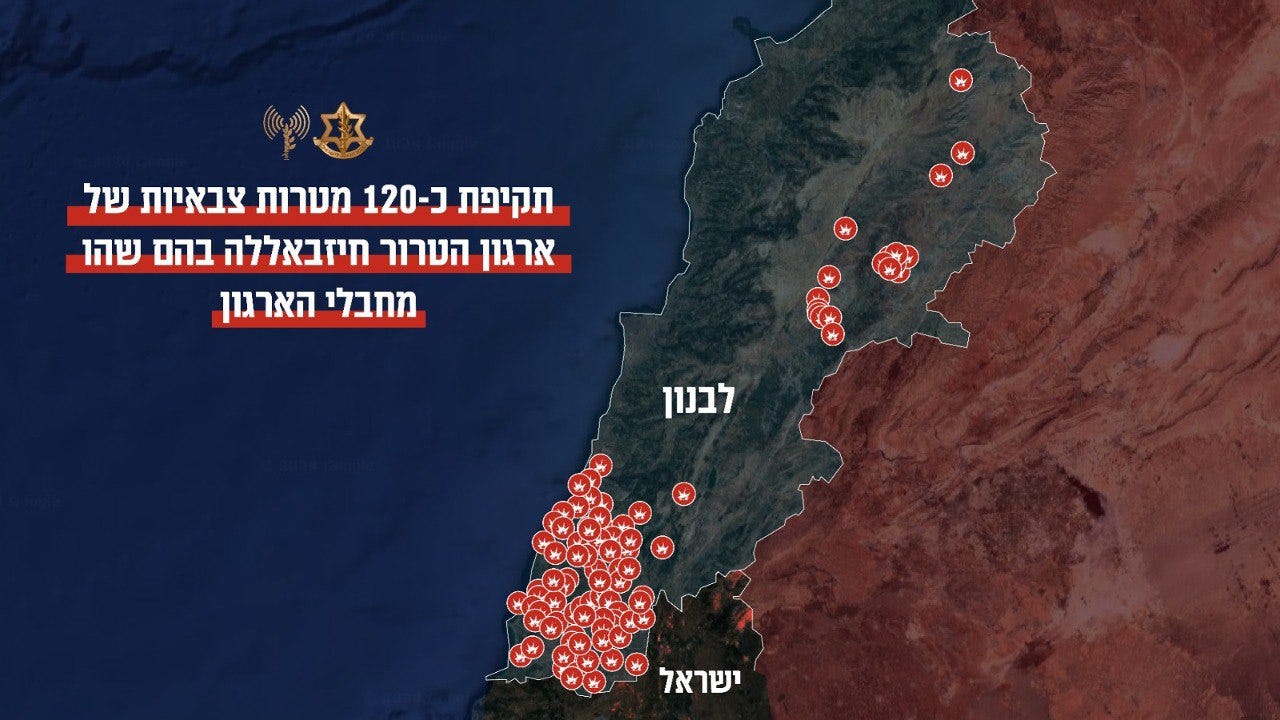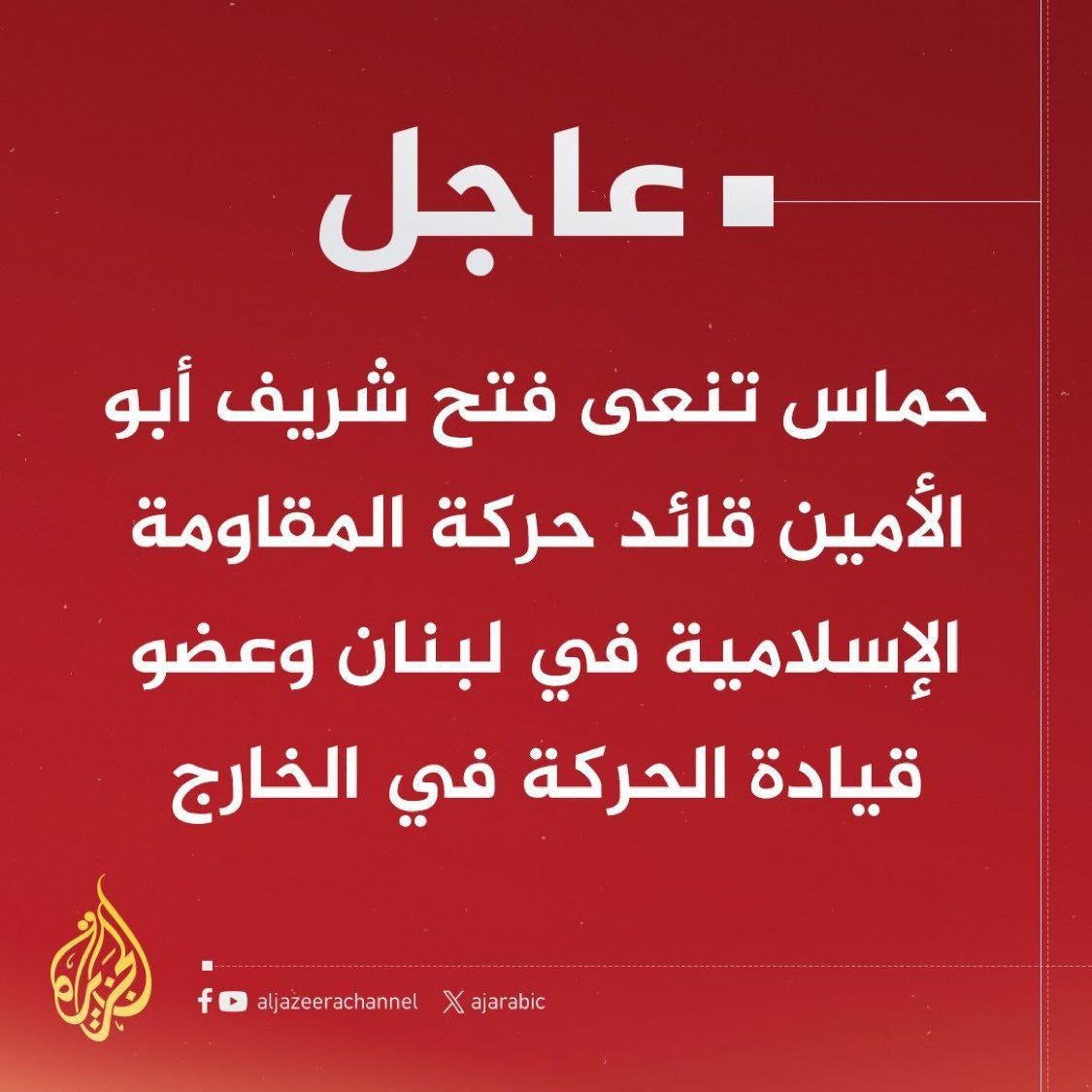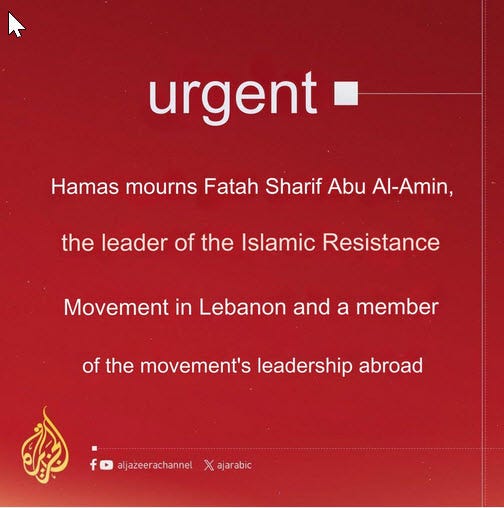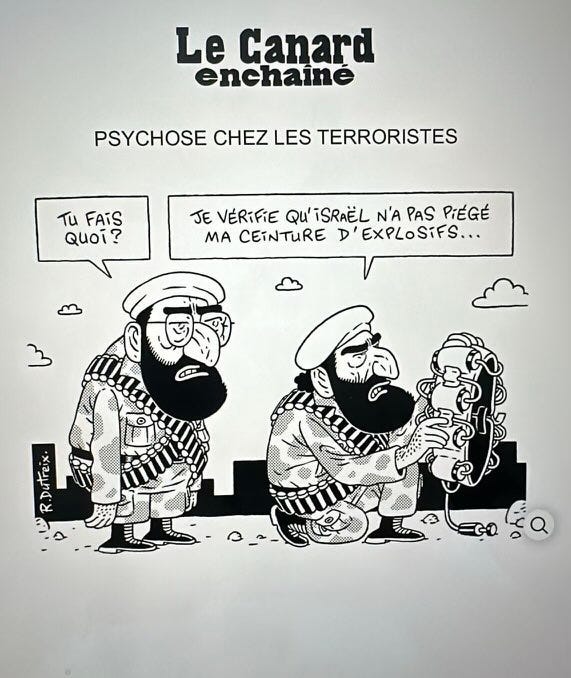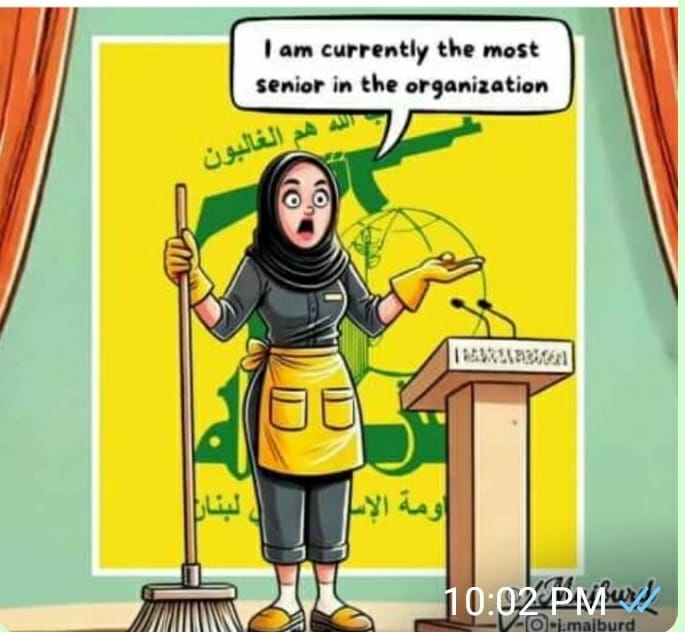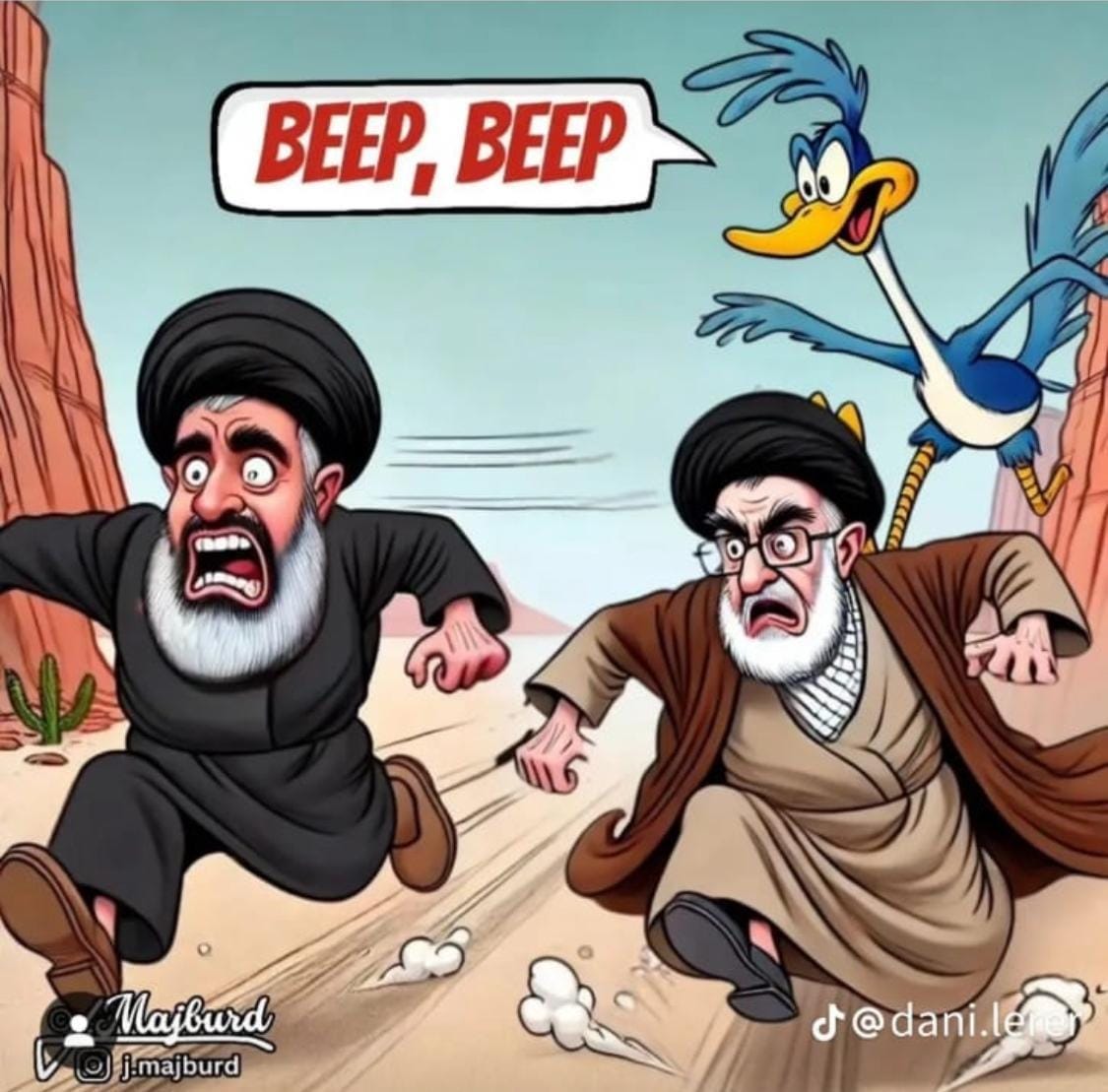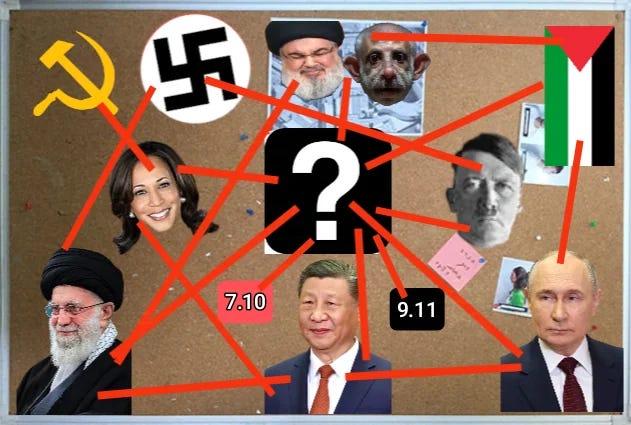First Time Here? Readers suggest starting with the expanded Gaza Explainer in #133 and #120.
Tags: 10 Min Read; Large Relief Area
Updated: After the email release, the English translation of the Vysotsky poem at bottom was touched up.
The weather is awesome. The food is good. No one--in my circles--wants a ground operation in Lebanon.
When I arrived in Tel Aviv two years ago, the light rail system was years behind schedule, and everyone was sick of construction everywhere and roads blocked all over the place. An apartment I considered was being vacated by a pair of European consultants whose job was to oversee the contractors. Specifically, to confirm the contractors delivered what was promised. Their departure meant... the first line should actually open soon!
About six months after my arrival, the Red Line, nearly 20 miles long, started service.
Today, a year and a half later, I rode it for the first time.
It's great!
Nasrallah and Symbolism
Symbolism can be literal and figurative.
Using penetration bombs to destroy a bunker 75-150 feet below the surface in the middle of Beirut has literal symbolism: Wherever you are, we will get you. But I want to share that Arabic speakers have been universal in speaking of Nasrallah as a unique figure. Whose power with language was his real strength and from which Hezbollah's stature flowed.
Allow me to give an example of what language can do in the Arabic speaking world: In the mid 1970's, the population of Jordan rioted in response to rising bread prices. The event, known as the Bread Riots, was calmed when King Hussein read a classic Arabic poem over the radio.
Nassim Nicholas Taleb has said: "It is worth learning Arabic just to read the Mu'allaqat" (a collection of pre-Islamic Arabic poetry by various authors).
Nasrallah was, by all reports, a master of the Arabic language, and using it to justify his cause and stimulate participation.
Among the folks I follow, the figurative blow to Hezbollah’s cause is thought larger than the literal.
Assembly Required...
First Gaza, now Lebanon. Something like a million displaced Lebanese at this point. And like the population of Gaza, the population of Lebanon is a tool/hostage of Iran. To assemble what you have seen here in #139, #140 and #141 -- including the Relief Areas, I am going to quote at length from Thomas Friedman's piece yesterday (PDF here):
After the Hamas invasion of Israel on Oct. 7, I argued that we were no longer in the Cold War, or the post-Cold War. We were in the post-post-Cold War: a struggle between an ad hoc “coalition of inclusion” — decent countries, not all of them democracies, who see their future as best delivered by a U.S.-led alliance nudging the world to greater economic integration, openness and collaboration to meet global challenges, like climate change — versus a “coalition of resistance,” led by Russia, Iran and North Korea: brutal, authoritarian regimes who use their opposition to the U.S.-led world of inclusion to justify militarizing their societies and maintaining an iron grip on power.
Russia attempted to stop Ukraine from joining the West (the European Union and NATO) and Iran, Hamas and Hezbollah attempted to stop Israel from joining the East (ties with Saudi Arabia). Because if Ukraine joined the European Union, the inclusive vision of a Europe “whole and free” would be almost complete and Vladimir Putin’s kleptocracy in Russia almost completely isolated.
And if Israel were allowed to normalize relations with Saudi Arabia, not only would that vastly expand the coalition of inclusion in that region — a coalition already expanded by the Abraham Accords that created ties between Israel and other Arab nations — it would almost totally isolate Iran and its reckless proxies of Hezbollah in Lebanon, the Houthis in Yemen and the pro-Iranian Shiite militias in Iraq, all of which were driving their countries into failed states.
Indeed, it is hard to exaggerate how much Hezbollah and its leader, Hassan Nasrallah, who was killed by an Israeli strike on Friday, were detested in Lebanon and many parts of the Sunni and Christian Arab world for the way they had kidnapped Lebanon and turned it into a base for Iranian imperialism.
I was speaking over the weekend to Orit Perlov, who tracks Arab social media for Israel’s Institute for National Security Studies. She described the flood of social media postings from across Lebanon and the Arab world celebrating Hezbollah’s demise and urging the Lebanese government to declare a unilateral cease-fire so the Lebanese Army could seize control of Southern Lebanon from Hezbollah and bring quiet to the border. The Lebanese don’t want Beirut to be destroyed like Gaza and they are truly afraid of a return of civil war, Perlov explained to me. Nasrallah had already dragged the Lebanese into a war with Israel they never wanted, but Iran ordered.
This comes on top of the deep anger for the way Hezbollah joined with the Syrian dictator Bashar al-Assad to crush the democratic uprising there. It is literally like the Wicked Witch from the Wizard of Oz is dead and now everyone is thanking Dorothy (i.e., Israel).
The Hezbollah-Hamas Paradox
To address the question of "military success" vis-a-vis Lebanon/Hezbollah yet failure vis-a-vis Gaza/Hamas, I quote from Amir Tibon of Haaretz:
One question that many people in Israel and around the world have been asking for the past two weeks is: How could the same Israeli military and intelligence services that so badly failed to stop Hamas' massacre on October 7, carry out such an incredibly successful series of strikes against Hezbollah, essentially eliminating the Lebanese terror organization's entire senior leadership without losing a single Israeli soldier?
To understand this paradox – the humiliation suffered by Israel at the hands of Hamas, a relatively weaker enemy, and the pain Israel has inflicted on the larger and better armed Hezbollah – requires a broader discussion of Israel's national security priorities over the span of two decades.
Ever since the 2006 Second Lebanon War, which ended with an Israeli military victory, but a sour mood among the public of a missed opportunity to remove the threat of Hezbollah from the northern border, Israel has been preparing for the war it is now fighting. The preparations for this war have been the Israeli military's top priority for the past 18 years. Unimaginable intelligence resources have been invested in this project, the Israel Air Force has been training for it more than for any other mission, and the results now seem to speak for themselves.
During this entire period, the danger posed by the Hamas terror regime in Gaza has been treated by Israel as a distraction that requires less resources and attention. In fact, Prime Minister Benjamin Netanyahu's entire approach to Gaza could be summed up in one sentence that he coined about a decade ago: "Quiet will be met with quiet." This was his formula. As long as Hamas kept the Gaza front relatively quiet, Israel allowed it to develop new weapons, receives billions of dollars, and build an army of terror on Israel's southern border almost undisturbed.
In fact, just one week before October 7, Netanyahu reached yet another agreement with Hamas – allowing the organization access to more money from Qatar and promising more work permits for residents of Gaza to enter Israel in return for Hamas' enforcement of quiet after several weeks of riots along the border fence. Following that agreement, the border indeed remained quiet, and Israel let down its guard – and then the massacre happened.
At the same time, Israeli officials and senior IDF officers were already discussing the possibility of a war breaking out in the north. But they knew they would be well prepared for that war. Instead, Hamas surprised them.
Now, a year later, Israel is still struggling to find a solution for Gaza, where 101 hostages are still held by Hamas, and where the Palestinian terror group is significantly weakened, but already rebuilding its local government. Meanwhile, Israel is off to a great start in the implementation of its war plan in Lebanon.
To illustrate the above, here is an IDF map of recent airstrikes in Lebanon:
Postmark
Northern Tip of Israel
IDF: Following a situational assessment, the areas of Metula, Misgav Am, and Kfar Giladi in northern Israel have been declared a closed military zone. Entry to this area is prohibited.
Beirut: Dahieh District (Hezbollah’s district)
Concurrent with the ground operation, the IDF spokesman in Arabic a short time ago publishes an evacuation notice for three different buildings in the Dahieh district in Beirut, located in the neighborhoods:
Barj al Baranja, a-Lildi and Harat Harikh.
Residents of these buildings and their neighbors are asked to evacuate to a distance of 500 meters from specific buildings.
A “knock on the roof” in Dahieh.
Beirut International Airport
The IDF publishes footage showing Hezbollah’s storage of surface to air rockets is located near the Beirut airport. Footage of the destruction of these caches shows massive secondary explosions (confirming that it is indeed weaponry being bombed by the IDF).
UNRWA - Lebanon
UNRWA has a presence in four or five countries in the region. One is in Lebanon. Then this occurs:
aka
Tonight, Israel attacked (for the first time) the Palestinian refugee camp of Al Bas in Tyre.
Fatah Sharif, chairman of the UNRWA teachers' association, was killed in the attack.
Hamas publishes an official proclamation in which it announces that Fatah Sharif is none other than:
الشهيد القائد فتح شريف أبو الأمين قائد حركة المقاومة الإسلامية حماس في لبنان وعضو قيادة الحركة في الخارجCommander of the Islamic Resistance Movement Hamas in Lebanon and Member of the Movement's Leadership Abroad
Exhibit 105 (?) in the takeover of UNRWA by Hamas….
Relief Area
Alef: From France
Terrorist psychosis: “What are you doing?” “I’m making sure that Israel hasn’t booby trapped my explosives belt“
Bet
Gimmel
Hey
Vav
There are still 101 hostages in Gaza
Zayin: Amos Oz
A Jew must keep the Sabbath! Says a religious to Amos Oz.
Amos Oz answers: I will keep the Sabbath as soon as you keep the sabbath.
The religious Jew replies: What does that mean? It is written: On Shabbat, do no work! And I do exactly that.
Amos Oz responds: Yes, but the commandment of Shabbat begins with the words: Six days you shall work...
(To the topic of the Religious not “carrying the burden” of being productive members of society, such as serving in the military...)
Chet: I have a theory!
Tet: National birds per country
Yod: Saw this while sitting on train to Petah Tikvah...
(On social media there is a meme of Petah Tikva being the most boring place on earth, and something unimaginable to the anti-Israel protesters… as a place plain boring and ‘normal.’)
I close with one of my favorite poems:
Высоцкий - Как призывный набат... (Песня о новом времени)
Vysotsky - Red Alert - (Song about a new era)
Как призывный набат, прозвучали в ночи тяжело шаги,
Значит, скоро и нам уходить и прощаться без слов.
По нехоженным тропам протопали лошади, лошади,
Неизвестно к какому концу унося седоков.
Наше время - иное, лихое, но счастье, как встарь, ищи!
И в погоню за ним мы летим, убегающим, вслед.
Только вот в этой скачке теряем мы лучших товарищей,
На скаку не заметив, что рядом товарищей нет.
И еще будем долго огни принимать за пожары мы,
Будет долго зловещим казаться нам скрип сапогов,
Про войну будут детские игры с названьями старыми,
И людей будем долго делить на своих и врагов.
А когда отгрохочет, когда отгорит и отплачется,
И когда наши кони устанут под нами скакать,
И когда наши девушки сменят шинели на платьица,
Не забыть бы тогда, не простить бы и не потерять!
-- Translation by R.Z., September, 2024
Like an alarm bell, heavy steps sound in the night,
Meaning: Time to go and say farewell without words.
On untrodden paths our horses gallop,
To ends unknown the rider carried.
Our time is different, evil. For happiness, search! Like of old!
And racing in chase, we fly after what runs ahead.
Only in this race our comrades are lost to us,
Running so hard we don't notice: They're already gone.
Long shall flames be seen as infernos,
Long will be ominous to us: The sound of squeaking boots.
For years to come kids will play games with old war names
And we will for long divide people into us and them.
When the noise, fires and tears have faded,
And our horses under us tire,
And our girls shed greatcoats for dresses,
Don't forget. Don't forgive. And the lesson: Don't lose!
To a Peaceful New Year,
Raf
(Thank you A.K., M.T., A.K.Z.)



